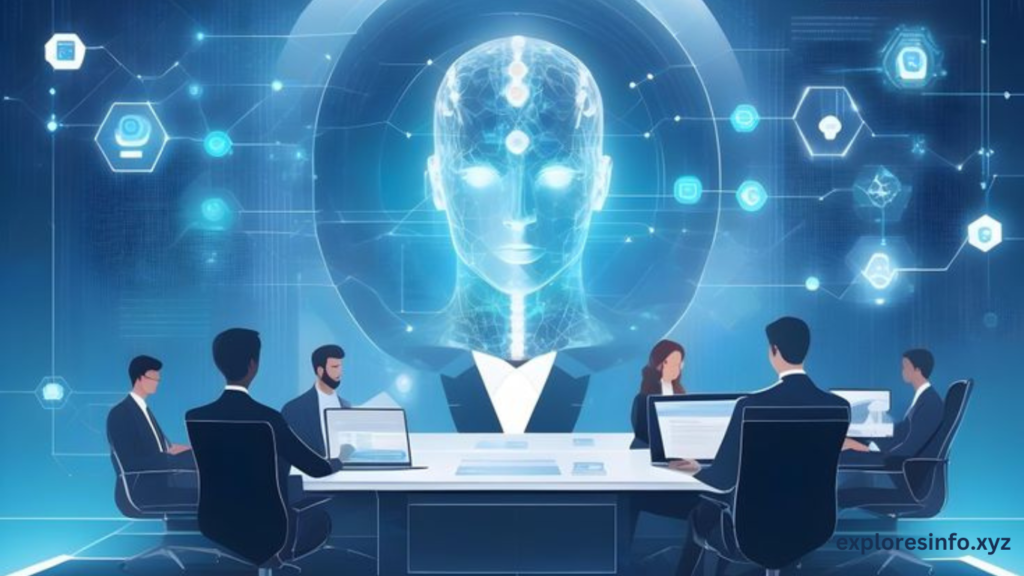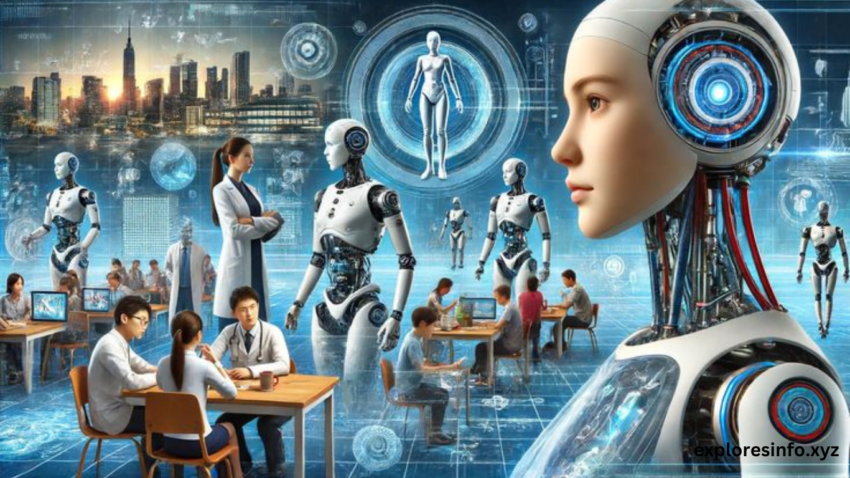Artificial Intelligence (AI) is no longer a concept confined to science fiction or futuristic dreams. It is here, and it is changing the way we live, work, and interact with the world around us. From the way we shop online to how doctors diagnose diseases, AI is quietly weaving itself into the fabric of our daily lives. But what does this mean for the future of society? How will AI shape the world we live in, and what challenges and opportunities will it bring? This article explores the transformative impact of AI on future society, focusing on its potential to improve lives, its role in solving global challenges, and the ethical considerations we must address to ensure it benefits everyone.
What is AI, and Why Does It Matter?
At its core, AI refers to machines or computer systems that can perform tasks that typically require human intelligence. These tasks include learning, reasoning, problem-solving, understanding language, and even recognizing emotions. AI systems are powered by algorithms—sets of rules or instructions—that allow them to analyze data, identify patterns, and make decisions.
AI matters because it has the potential to make our lives easier, more efficient, and more productive. It can automate repetitive tasks, provide personalized recommendations, and even predict future outcomes. But beyond convenience, AI has the power to tackle some of the world’s biggest challenges, from climate change to healthcare access. However, with great power comes great responsibility. As AI becomes more advanced, it raises important questions about ethics, privacy, and fairness that society must address.
AI in Everyday Life: Making Life Easier
AI is already transforming the way we live, often in ways we don’t even notice. Here are a few examples of how AI is making life easier:
- Virtual Assistants: Tools like Siri, Alexa, and Google Assistant use AI to understand and respond to our voice commands. They can set reminders, play music, answer questions, and even control smart home devices like lights and thermostats.
- Personalized Recommendations: When you shop online or watch a movie on Netflix, AI algorithms analyze your preferences and suggest products or content you might like. This makes it easier to find what you’re looking for and discover new things.
- Navigation Apps: Apps like Google Maps and Waze use AI to analyze traffic patterns and provide real-time directions. They help us avoid traffic jams, find the fastest routes, and even locate nearby gas stations or restaurants.
- Healthcare Diagnostics: AI is helping doctors diagnose diseases more accurately and quickly. For example, AI systems can analyze medical images like X-rays or MRIs to detect conditions like cancer or heart disease.
- Language Translation: Tools like Google Translate use AI to break down language barriers, allowing people to communicate across different languages with ease.
These examples show how AI is already improving our lives in small but meaningful ways. But this is just the beginning.
AI’s Role in Solving Global Challenges
One of the most exciting aspects of AI is its potential to address some of the world’s most pressing challenges. From climate change to healthcare, AI can provide innovative solutions that were previously unimaginable.
1. Climate Change and Environmental Sustainability
AI can play a crucial role in mitigating its impact by:
- Optimizing Energy Use: AI can analyze energy consumption patterns and suggest ways to reduce waste. For example, Google has used AI to reduce the energy used for cooling its data centers by up to 40%.
- Predicting Natural Disasters: AI can analyze weather data to predict events like hurricanes, floods, and wildfires, giving communities more time to prepare and respond.
- Improving Renewable Energy: AI can optimize the performance of wind and solar farms by predicting energy production and demand.
2. Healthcare Access and Innovation
AI has the potential to revolutionize healthcare by making it more accessible, affordable, and effective. Some key applications include:
- Early Disease Detection: AI can analyze medical data to detect diseases like cancer or diabetes at an early stage, when they are easier to treat.
- Personalized Medicine: AI can help doctors tailor treatments to individual patients based on their genetic makeup, lifestyle, and medical history.
- Telemedicine: AI-powered platforms enable remote consultations, making healthcare accessible to people in rural or underserved areas.
3. Education for All
AI can help bridge the education gap by providing personalized learning experiences to students worldwide. For example:
- Adaptive Learning Platforms: These platforms use AI to assess students’ strengths and weaknesses and tailor lessons to their individual needs.
- Language Translation: AI-powered tools can translate educational content into multiple languages, making it accessible to non-native speakers.
- Virtual Tutors: AI can provide instant feedback and support, helping students master challenging concepts.
4. Food Security
With the global population expected to reach 9.7 billion by 2050, ensuring food security is a critical challenge. AI can help by:
- Optimizing Crop Yields: AI can analyze soil conditions, weather patterns, and crop health to help farmers maximize their harvests.
- Predicting Pest Outbreaks: AI can predict and prevent pest infestations, reducing crop losses.
- Improving Supply Chains: AI can optimize the distribution of food, reducing waste and ensuring that it reaches those in need.

The Ethical Challenges of AI
While AI offers immense potential, it also raises important ethical questions that society must address. These challenges include:
1. Data Privacy
AI systems rely on various amount of data. However, the collection and use of personal data raise concerns about privacy and security. Unauthorized access to sensitive data can lead to identity theft, financial fraud, and other malicious activities.
2. Algorithmic Bias
AI algorithms are only as good as the data they are trained on. If the training data contains biases. This can lead to unfair treatment of certain groups, particularly in areas like hiring, lending, and law enforcement. Addressing algorithmic bias requires diverse and representative datasets, as well as ongoing monitoring and evaluation of AI systems.
3. Job Displacement
The automation of tasks through AI has the potential to displace jobs, particularly in industries like manufacturing, retail, and transportation. While AI can create new job opportunities, there is a risk of widening the skills gap and exacerbating income inequality. It is crucial to invest in education and training programs to equip workers with the skills needed for the jobs of the future.
4. Autonomous Weapons
The development of autonomous weapons, powered by AI, raises ethical and security concerns. The use of AI in military applications could lead to unintended consequences, including the escalation of conflicts and the loss of human control over critical decisions. International cooperation and regulation are needed to prevent the misuse of AI in warfare.
5. Accountability and Transparency
As AI systems become more complex, it can be challenging to understand how they make decisions. This lack of transparency can lead to a loss of accountability, particularly in high-stakes applications like healthcare and criminal justice. Ensuring that AI systems are explainable and transparent is essential for building trust and ensuring that they are used responsibly.
The Future of AI: Opportunities and Responsibilities
The future of AI is exciting . As AI continues to evolve, it will likely become even more integrated into our lives, driving innovation and addressing global challenges. However, realizing the full potential of AI requires careful consideration of its ethical implications and a commitment to responsible development.

1. Human-AI Collaboration
Human-AI collaboration can lead to new levels of creativity, productivity, and problem-solving. For example, AI can assist doctors in diagnosing diseases, enabling them to focus on patient care. In creative fields, AI can generate ideas and inspiration, empowering artists, writers, and designers to push the boundaries of their craft.
2. AI for Social Good
AI has the potential to explore positive social change. From improving healthcare access to addressing climate change, AI can be a powerful tool for social good. Initiatives like AI for Good, led by the United Nations, are exploring how AI can be used to achieve the Sustainable Development Goals (SDGs). By harnessing the power of AI for social good, we can create a more equitable and sustainable world.
3. Ethical AI Development
As AI becomes more powerful, it is essential to prioritize ethical considerations in its development. It also involves addressing the potential risks and unintended consequences of AI, from job displacement to autonomous weapons. By adopting a human-centered approach to AI development, we can ensure that AI serves the best interests of humanity.
4. Global Collaboration
The development of AI requires global collaboration. AI is a global technology, and its impact national borders. International cooperation is needed to establish common standards, share best practices, and address global challenges. By working together, we can harness the transformative power of AI to create a better future for all.
Conclusion
AI is a transformative force that is reshaping the world as we know it. From revolutionizing industries to addressing global challenges, AI has the potential to drive innovation and create new opportunities for growth. However, the rapid advancement of AI also raises important ethical and societal questions that must be addressed to ensure its responsible development and deployment.
As we stand on the brink of an AI-driven era, it is essential to foster collaboration between technologists, policymakers, and society at large. By embracing the opportunities while addressing the challenges, we can harness the power of AI to create a more equitable, innovative, and prosperous future for all. The question is no longer whether AI will shape our world, but how we will shape AI to serve humanity’s best interests. The transformative power of AI is undeniable, and its potential to shape the future of society is limitless.
Frequently Asked Questions (FAQs)
1. What is AI, and how does it work?
AI, or Artificial Intelligence, refers to computer systems that can perform tasks that usually require human intelligence, like learning, problem-solving, and decision-making. It works by analyzing large amounts of data, identifying patterns, and using those patterns to make predictions or decisions. Think of it like teaching a computer to “think” by showing it examples and letting it learn from them.
2. How is AI already affecting our daily lives?
AI is already part of our everyday lives in ways you might not even notice. For example:
- Virtual Assistants: Siri, Alexa, and Google Assistant use AI to answer your questions or play your favorite songs.
- Online Shopping: When Amazon suggests products you might like, that’s AI analyzing your past purchases.
- Navigation Apps: Google Maps uses AI to find the fastest route and avoid traffic jams.
- Social Media: AI helps filter your newsfeed and detect harmful content.
In short, AI is quietly making life more convenient and efficient.
3. Will AI take away jobs?
AI will change the job market, but it’s not just about job loss. While some repetitive tasks may be automated, AI will also create new jobs and opportunities. For example:
- Jobs in AI development, data analysis, and tech support will grow.
- AI can help workers be more productive by handling boring or time-consuming tasks, freeing them up to focus on creative or strategic work.
The key is to adapt by learning new skills and staying flexible in a changing world.
4. Can AI help solve big problems like climate change or healthcare?
Absolutely! AI has the potential to tackle some of the world’s biggest challenges:
- Climate Change: AI can optimize energy use, predict natural disasters, and improve renewable energy systems.
- Healthcare: AI can help doctors diagnose diseases earlier, personalize treatments, and even discover new medicines.
- Education: AI can provide personalized learning experiences, making education more accessible to everyone.
By analyzing data and finding patterns, AI can help us make smarter decisions and solve problems faster.
5. Is AI safe to use?
AI is generally safe when designed and used responsibly. However, there are risks, such as:
- Privacy Concerns: AI systems often rely on personal data, so it’s important to protect that information.
- Bias: If the data used to train AI is biased, the AI might make unfair decisions. For example, a biased hiring algorithm could favor certain groups over others.
- Lack of Transparency: Sometimes, it’s hard to understand how AI makes decisions, which can make it difficult to trust.
To make AI safe, we need strong regulations, ethical guidelines, and ongoing monitoring.
6. Can AI think like a human?
Not exactly. While AI can mimic some aspects of human thinking, like recognizing patterns or solving problems, it doesn’t have emotions, consciousness, or true understanding. AI is a tool that follows instructions and learns from data, but it doesn’t “think” or “feel” like a human does.
7. What are the ethical concerns around AI?
AI raises several ethical questions, including:
- Fairness: How do we ensure AI treats everyone equally and doesn’t discriminate?
- Privacy: How do we protect people’s data when AI systems rely on it?
- Accountability: Who is responsible if an AI system makes a mistake or causes harm?
- Transparency: How do we make sure AI decisions are clear and understandable?
Addressing these concerns is crucial to ensuring AI benefits everyone and doesn’t harm society.
8. Will AI ever become smarter than humans?
AI can outperform humans in specific tasks, like playing chess or analyzing data, but it doesn’t have general intelligence like humans do. While AI can be incredibly powerful, it lacks creativity, empathy, and common sense. The idea of AI becoming “smarter” than humans in every way (often called “superintelligence”) is still a topic of debate and remains far off, if it ever happens at all.
9. How can we ensure AI benefits everyone?
To make sure AI benefits everyone, we need:
- Inclusive Development: AI should be designed with input from diverse groups to avoid bias and ensure fairness.
- Education and Training: People need to learn how to use and adapt to AI technologies.
- Regulations and Ethics: Governments and organizations must create rules to ensure AI is used responsibly and ethically.
- Global Collaboration: Countries and companies should work together to share knowledge and address challenges.
By taking these steps, we can ensure AI improves lives without leaving anyone behind.
10. What’s the future of AI?
The future of AI is full of possibilities. It could:
- Revolutionize industries like healthcare, education, and transportation.
- Help solve global challenges like climate change and poverty.
- Create new jobs and opportunities we can’t even imagine yet.
However, the future of AI also depends on how we choose to develop and use it. By focusing on ethics, fairness, and collaboration, we can shape a future where AI makes the world a better place for everyone.
11. Can AI replace human creativity?
AI can assist with creative tasks, like generating music, art, or writing, but it doesn’t replace human creativity. AI lacks the emotions, experiences, and imagination that drive true creativity. Instead, AI can be a tool to inspire and enhance human creativity, helping artists, writers, and designers explore new ideas.
12. How can I learn more about AI?
If you’re curious about AI, there are many ways to learn:
- Online Courses: Platforms like Coursera, edX, and Khan Academy offer beginner-friendly AI courses.
- Books and Articles: Look for books or articles that explain AI in simple terms.
- Podcasts and Videos: Many creators break down AI concepts in easy-to-understand ways.
- Hands-On Practice: Try experimenting with AI tools or coding platforms like TensorFlow or Python.
Learning about AI doesn’t have to be complicated—start small and explore at your own pace!
